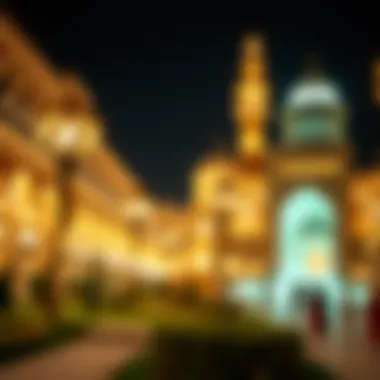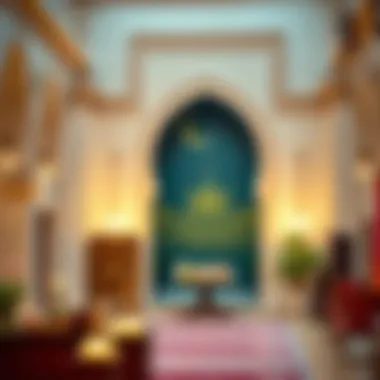Ramadan 2024 in the UAE: A Guide for Investors


Intro
As the sun sets and the call to prayer fills the air, the month of Ramadan resonates deeply within the hearts of millions across the United Arab Emirates. It’s not merely a period of fasting; it’s a profound season that intertwines spirituality, community, and cultural heritage. For property investors and residents alike, Ramadan 2024 offers a unique lens through which to view market dynamics and community living. Understanding this holy month is indispensable for navigating the nuances of real estate in a city as vibrant as Dubai.
This article will delve into the significance of Ramadan, highlight how it influences both the local lifestyle and the property market, and provide essential insights for expatriates considering the UAE as their new home. The implications of Ramadan extend beyond spiritual observances; they ripple through the real estate landscape, shaping investments, community interactions, and even daily life in Dubai.
Throughout our exploration, we aim to provide substantial information that resonates with homebuyers, seasoned investors, real estate agents, and property managers. Our journey will uncover the unique interplay of cultural practices during Ramadan and their implications for property investment.
So let’s embark on this enlightening journey to understand the essence of Ramadan in the UAE and how it shapes the living experience and investment opportunities in one of the world’s most dynamic cities.
Foreword to Ramadan
Ramadan holds a unique place in the hearts of millions, particularly within the context of the UAE. It is not merely a month of fasting but a transformative period for personal reflection, community bonding, and spiritual growth. By understanding Ramadan, property investors and residents can better grasp the rhythm of life during this time, which greatly influences both cultural experiences and market dynamics.
Overview of Ramadan
Ramadan is the ninth month of the Islamic calendar, observed by Muslims worldwide as a month of fasting, prayer, and reflection. From dawn until sunset, those practicing the faith abstain from food, drink, and other physical needs. This annual observance begins with the sighting of the moon and lasts for 29 or 30 days, ending in the celebration of Eid al-Fitr. Each day, individuals break their fast with a meal known as Iftar, traditionally starting with dates and water, followed by a larger feast.
This month emphasizes self-discipline and empathy towards those who are less fortunate, fostering a sense of community. While the spiritual aspects dominate, the economic and social facets should not be overlooked. Ramadan influences various sectors, including real estate, food, and entertainment, rendering it crucial for residents and investors to stay informed about the implications of this holy month.
Significance of Ramadan in the UAE
In the UAE, Ramadan is revered with great fervor, intertwining cultural practices and national identity. This period symbolises unity, compassion, and charity, often bringing people together across various backgrounds. Local markets flourish with traditional goods, and restaurants provide special Iftar menus that cater to the community's diverse tastes.
Moreover, it is essential for property investors to recognise the changes that come with Ramadan. Many companies adjust their operating days and hours, creating a distinct business rhythm that can have implications for investment strategies.
- Community Engagement: As Ramadan draws near, it is common for individuals, families, and organizations to increase charitable activities, with donations made both in cash and in-kind.
- Cultural Events: Cities like Dubai become vibrant hubs for various events, including art exhibitions, cultural showcases, and themed markets.
Understanding these dynamics is pivotal. Not only do they reflect the collective spirit of the Emirati society, but they also give insight into potential opportunities that could arise in real estate investment and development during this time. As the UAE thrives on its rich tapestry of cultures, property stakeholders must stay attuned to these changes during the holy month.
Ramadan Timings and Dates in
Understanding the specific timings and dates of Ramadan in 2024 is vital for both residents and property investors in the UAE. The significance of Ramadan extends beyond religious observance; it brings about an atmosphere of community, reflection, and engagement that can influence various aspects of daily life. For investors, being aware of these timings can guide marketing strategies and investment decisions, while residents can benefit from understanding how their daily routines will shift during this holy month.
Key Dates for Ramadan
Ramadan is anticipated to begin on the evening of Sunday, March 10, 2024, and will run until the evening of Tuesday, April 9, 2024. These dates are determined by the sighting of the moon, which may vary slightly based on geographical location. Therefore, it is advisable to stay updated through local announcements to confirm the precise start and end. During this time, fasting from dawn until sunset will be observed, which affects work hours, public services, and social gatherings.


Noteworthy key dates surrounding Ramadan include:
- First Tarawih Prayer: The first night prayers will begin on the night of March 10, 2024. This is a time for heightened spiritual focus for many.
- Laylat al-Qadr (Night of Power): A significant night during the last ten days of Ramadan, estimated to fall between April 8 and April 9, is known to hold extra blessings.
- Eid al-Fitr: Expected to be celebrated likely on the morning of April 10, 2024, marking the end of Ramadan, this day holds immense cultural and religious significance.
Awareness of these crucial dates allows investors and residents to plan accordingly, whether it’s adjusting business operations, hosting community events, or preparing for the celebrations after fasting.
Eid al-Fitr and Its Importance
Eid al-Fitr, which translates to
Cultural Practices During Ramadan
Cultural practices during Ramadan shape not only the observance of this holy month but also influence the day-to-day dynamics in the UAE. For expatriates and residents alike, understanding these customs enriches the experience and helps in navigating social interactions and business dealings during this time. The communal aspect of Ramadan, with its focus on togetherness and generosity, is particularly important for those considering property investment or residing in the UAE.
Traditions and Rituals
Many traditions emerge during Ramadan, some rooted deeply in Islamic history while others showcase the local culture in the UAE. One prominent practice is the nightly prayer called Taraweeh, which takes place after the Isha prayer. These prayers involve lengthy recitations of the Quran, allowing the community to come together in worship and reflection.
Families tend to gather for Iftar, the meal that breaks the fast at sunset. Each evening, it’s common for households to prepare large feasts, often shared with neighbors or those in need. This act of sharing symbolizes not just charity but also community spirit, stimulating kinship among families and friends.
"The essence of Ramadan is not just in fasting but in uniting people through collective acts of kindness and gratitude."
Moreover, one notable tradition in the UAE is the distribution of Zakat, a form of almsgiving that is crucial to Islamic practice and observed more prominently during this month. Many people contribute a portion of their wealth during Ramadan to support those less fortunate, reinforcing social responsibility in the community.
Iftar and Suhoor: Daily Practices
Iftar and Suhoor are two key meals that play a central role in the Ramadan experience. Iftar signifies the end of daily fasting, typically starting with the consumption of dates and water. The meal often features a variety of local dishes, from harees to falafel, reflecting the rich culinary heritage of the UAE. Restaurants offer special Iftar packages, creating opportunities for socializing and cultural exchange.
On the flip side, Suhoor is the pre-dawn meal that sustains individuals until Iftar. This meal generally includes wholesome foods that provide energy throughout the day. People often take this time to gather, fostering a sense of community as they prepare to engage in fasting.
Both meals significantly influence local culture. The practice of sharing Iftar with neighbors, friends, or even strangers opens dialogue about tradition and sustains the communal fabric essential for expatriates integrating into UAE society. Investors might note that many businesses capitalize on these meals, offering promotions which bring people together, positively impacting local economies during the month.
Overall, engaging with these cultural practices can enhance one's understanding of Ramadan, making the observance richer for both residents and investors alike.
Impact on Daily Life in Dubai
Ramadan holds a mirror to the essential nature of life in Dubai, showcasing its unique blend of tradition and modernity. Key changes in daily routines, especially concerning work hours and community activities, create a distinctive atmosphere during this holy month. Understanding these shifts is crucial for both residents and property investors to navigate daily life effectively and derive benefits from the cultural fabric that Ramadan weaves throughout the city.


Changes in Work Hours
During Ramadan, businesses in Dubai adjust their operating hours significantly. It's common for many private companies to adopt a shortened work schedule, usually ranging between six to seven hours per day. Government offices typically shift their hours to between 9 AM and 2 PM, allowing employees to return home in time for iftar, the evening meal that breaks the fast. This adjustment fosters a sense of community and adherence to religious practices.
For property investors and residents alike, being aware of this shift is essential. Work hours can affect everything from transaction timelines to property management schedules.
- Key points to consider:
- Increased flexibility: Meetings often shift to earlier hours, leading to more lenient appointment schedules.
- Impact on the service sector: Dining establishments operate at night; brunches and day events decrease as people fast.
- Real estate viewings: Investors might schedule property showings later in the day when families are more likely to be available.
These changes can encourage a communal spirit, as many businesses engage in community initiatives and events tailored to reflect Ramadan's essence through offerings such as iftar meals.
Community Engagement and Activities
Ramadan in Dubai is not just a month of fasting; it's a vibrant tapestry of community-focused activities. The spirit of generosity and togetherness becomes palpable, revealing the heart of Emirati culture. Various activities emerge that enrich the social fabric, providing significant opportunities for interaction.
- Iftar gatherings: Families and friends come together to share meals, often in traditional settings, fostering social bonds while reinforcing community relations. Public iftar tents, set up around the city, allow residents and expatriates to join in and relish large community meals.
- Cultural events: Many local organizations host cultural activities, from art exhibitions to storytelling sessions that celebrate Ramadan's themes. Such events present opportunities for property investors to network and engage with potential clients in more relaxed settings.
- Volunteerism and charity: Ramadan emphasizes charity, raising awareness for various causes. Investments in community projects or charitable events can both strengthen connections and elevate a property’s standing in the market, reflecting a commitment to corporate social responsibility.
Ramadan's Effect on the Real Estate Market
Ramadan, a month of deep reflection and community bonding, exerts a unique influence on the real estate market in the UAE. This period sees a shift not only in cultural and social activities but also in buying and selling behaviors. Understanding these effects can provide investors and residents with a clear lens through which to view the property market during this time.
Market Trends During Ramadan
During Ramadan, the real estate market tends to experience subtle fluctuations. One notable trend is the uptick in demand for rental properties and short-term stays. Many expatriates or tourists flock to the UAE to partake in the month’s festivities. This increase in visitors often leads to a spike in the rental market, with many looking for temporary accommodation that allows them to immerse in the local culture.
- Increased Rental Demand: With many locals hosting iftars and gatherings, the need for larger spaces rises. Investors should consider properties that can cater to families and groups.
- Seasonal Promotions: Landlords might introduce special Ramadan offers to entice tenants, yielding attractive deals in a competitive market.
- Sustained by Eid al-Fitr: As the month progresses, there's a crescendo in housing inquiries that inevitably aligns with the festive period of Eid. This results in savvy investors capturing the essence of these transactions.
Investment Opportunities in Ramadan
Investing during Ramadan presents unique opportunities. While some investors may hesitate, believing that the month slows down the general pace of the market, those who look closely can find great prospects. Here are some points to consider:
- Off-Peak Pricing: The perception of a slower market often leads sellers to price their properties more attractively. With careful analysis, investors might discover undervalued properties that could yield significant returns in the post-Ramadan period.
- Community-Centric Developments: Investing in neighborhoods that emphasize community gatherings and cultural events can be rewarding. Properties near mosques, markets, and community centers tend to attract higher demand.
- Flexible Financing Options: Some financial institutions may offer tailored solutions during Ramadan, recognizing the unique circumstances of buyers. Investors should explore these options to enhance their purchasing power.
Key Insight: The real estate landscape during Ramadan is distinctive; it calls for strategic consideration. Investors who commit to understanding the seasonal shifts in the market can leverage opportunities often overlooked by others.
In summary, Ramadan can significantly shape the real estate market dynamics in the UAE. Both investors and residents must stay attuned to the nuances that this period brings, ensuring informed decisions in their property endeavors.


Considerations for Expatriates
Navigating life in a new country is always tricky, and moving to the UAE during Ramadan requires special attention to its unique practices and cultural sensitivities. For expatriates, understanding how to adapt smoothly during this holy month can not only make for a more enriching experience but also show respect for local customs.
Relocating During Ramadan
Timing is everything when making a move. Relocating to the UAE during Ramadan might seem daunting, yet it can provide a unique opportunity to immerse oneself in the cultural essence of the region.
- Real Estate Availability: Many landlords in the UAE may be more flexible with rental terms during Ramadan. This can lead to favorable negotiations in terms of lease conditions and potentially lower rental costs as demand may shift.
- Residential Community: Choosing to settle in a community that is vibrant yet considerate of Ramadan practices can enhance quality of life. Certain areas, known for their cultural openness, such as Dubai Marina or Abu Dhabi’s Corniche, may offer easier integration into local traditions while providing necessary amenities.
- Settling In: It's important to consider logistical aspects such as moving services and utility setup. Some services may operate on reduced hours, which might affect immediate needs like internet installation and water supply activation.
Additionally, prospective expatriates should also account for cultural events, if possible. Shared community iftars (the evening meal to break the fast) can serve as the perfect icebreaker to meet new neighbors and fellow expatriates.
Navigating Cultural Sensitivity
Cultural sensitivity during Ramadan cannot be overstated. Understanding the practices will foster goodwill and respect in the community, a valuable asset for anyone living abroad.
- Respecting the Fast: Expatriates should be conscious not to eat or drink in public during the fasting hours, which are from dawn until sunset. Not only does this show respect, but it also helps in gaining acceptance and building rapport with Muslim peers.
- Attending Events: Many establishments will host events that promote cultural exchange during this holy month. Attending these events can help expatriates integrate into the social fabric of the UAE. Activities like public iftars and Ramadan nights are often filled with local food, music, and a communal spirit that connects people from various backgrounds.
- Engaging with Locals: Building relationships with local residents can enhance one’s experience. Learning a few basic Arabic phrases, such as greeting people with "Ramadan Kareem," can go a long way in breaking the ice.
"Embracing the local culture not only enriches your life in the UAE but also fosters deep connections, providing a sense of home away from home."
Finale
The conclusion serves as a vital component in wrapping up the discussion on Ramadan 2024 within the context of the UAE's unique environment. This article emphasizes several specific elements, each reflecting broader implications for both residents and property investors.
First and foremost, the conclusion reiterates the intrinsic significance of Ramadan, not just as a period of fasting and reflection but also as a time that fosters community bonds and cultural appreciation among diverse populations. For expatriates and newcomers, understanding this aspect fosters a sense of belonging.
Moreover, the importance of market insights cannot be overstated. Analyzing trends during Ramadan can yield valuable information for potential investors. It assists in identifying pockets of opportunity that might not otherwise be evident throughout the year. Keeping a close eye on the fluctuations in demand and property prices shows how Ramadan influences purchasing behaviors.
With the array of community engagements and activities that unfold during this month, there arise additional considerations for those involved in property management. It highlights the need for adaptability in business practices and marketing strategies.
Ramadan is also a time for reflection, and the conclusion encourages readers to consider smaller details that enhance quality of life. This can range from finding the right Iftar spots to optimizing one’s neighborhood experience during the holy month.
In sum, Ramadan presents a dual narrative: a cultural phenomenon interwoven with economic implications. The insights shared in this article equip property investors and residents alike with the necessary tools to navigate this unique period with a deeper understanding, ultimately enriching their experience in the UAE.
Final Thoughts on Ramadan in the UAE
As Ramadan approaches in 2024, it serves as an opportunity for individuals and families in the UAE to pause and reflect on their values and priorities.
From the perspective of real estate, understanding this period provides investors an edge. The temporary shifts in community ambience, economic activities, and social practices can profoundly influence property dynamics.
Here are some final takeaways to keep in mind:
- Community Connection: The heightened sense of community during Ramadan can enhance property values, making locations that cater to the cultural needs more attractive.
- Market Insight: Observing the impact of Ramadan on consumer behavior offers crucial data points for making informed investment decisions.
- Cultural Awareness: It’s essential for expatriates to engage respectfully and knowledgeably with the local practices, enhancing overall community relations.
Ultimately, Ramadan is a tapestry woven from threads of culture, spirituality, and economic activity. It calls for deeper engagement from both residents and investors willing to embrace its essence, making the UAE a unique place to experience this holy month in 2024 and beyond.



